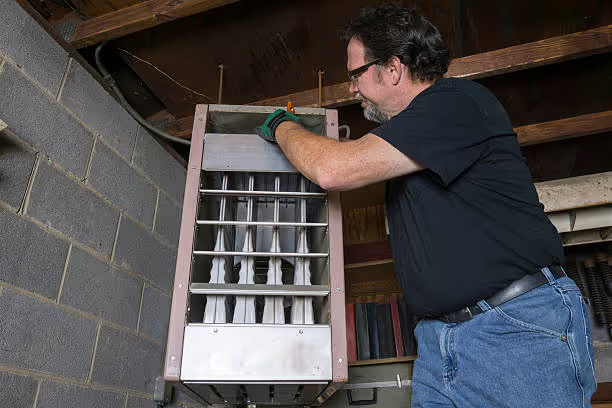Heating Replacement in Riverhead, NY
Replacing a worn-out or inefficient heating system is one of the most important investments you can make for comfort and long‑term energy savings in Riverhead, NY homes. Winters on the East End bring cold temperatures, salt‑air exposure, and higher heating loads for older, less‑insulated houses. This guide explains your full heating replacement options—furnaces, heat pumps and alternatives—how systems are evaluated and sized, typical installation steps and timelines, removal and disposal concerns, expected costs, and where to look for rebates and financing in Riverhead.

Why replace your heating system now
- Aging equipment loses efficiency and reliability, increasing energy bills and repair frequency.
- Modern systems deliver better comfort control, lower operating costs, and cleaner indoor air.
- Upgrading provides an opportunity to switch fuels (oil to natural gas or electric) or move toward electrification with heat pumps, which aligns with many local and state incentives.
Common heating replacement options for Riverhead homes
- Gas furnaces (natural gas or propane): Familiar option where gas service is available. High‑efficiency models (AFUE 95%+) are compact and pair well with existing duct systems.
- Oil furnaces and boilers: Still common in older Long Island houses. Replacement often includes consideration of switching to gas or a hybrid system if fuel access and economics permit.
- Air‑source heat pumps (cold‑climate models): Now viable for most Long Island winters; offer both heating and cooling, high efficiency, and excellent dehumidification for humid summers.
- Ductless mini‑split systems: Ideal for additions, older homes without ducts, or zoning difficult rooms. Can be used as primary heat in well‑insulated homes or supplemental heat.
- Hybrid (dual‑fuel) systems: Pair a heat pump with a gas furnace—heat pump operates when temperatures are mild, furnace handles the coldest days for efficiency and reliability.
- Geothermal (ground‑source) systems: Very efficient long‑term option but higher upfront cost and site requirements may limit feasibility on small lots.
Evaluating your home: sizing, load calculations, and fuel choices
A proper heating replacement begins with a professional evaluation:
- Manual J heat load calculation to determine the exact capacity your home needs—oversized equipment wastes energy and cycles poorly, undersized gear won’t keep up on the coldest nights.
- Duct inspection (Manual D considerations)—leaky or poorly sized ducts on Long Island can erode efficiency; repairs or redesign may be required.
- Fuel and utility assessment—confirm natural gas availability (varies by neighborhood), current electric rates, and whether switching fuels is practical.
- Site constraints—outdoor exposure to salt air in coastal parts of Riverhead can influence equipment selection and corrosion protection.
Energy‑efficient upgrades to combine with replacement
- High‑efficiency equipment: AFUE ratings for furnaces and HSPF/SEER for heat pumps matter—higher ratings reduce operating cost.
- Smart thermostats and zoning: Improve comfort and lower bills by matching heat to how you use the house.
- Air sealing and insulation: Reducing heat loss lowers required system size and can dramatically improve comfort.
- Ventilation and filtration improvements: Adding proper ventilation and upgraded filters helps indoor air quality after tightening the building envelope.
Installation process and timelines
- Initial on‑site assessment & estimate: 1 visit (1–2 hours) to gather measurements and discuss options.
- System selection & permits: 1–2 weeks to finalize equipment, secure local permits and schedule delivery (permitting timelines vary within Suffolk County).
- Removal of old system and installation:
- Furnaces or boilers: typically 1–2 days for a standard replacement.
- Heat pump systems: 1–3 days for a single outdoor unit with indoor air handler; more time for multi‑zone installs.
- Geothermal: several weeks to schedule and complete ground loops plus indoor equipment.
- Inspections & commissioning: Final inspection and system startup can add a few days depending on municipal scheduling.
Removal, disposal and code considerations
- Refrigerant recovery: Required by federal law when removing equipment containing refrigerant; licensed technicians must reclaim and recycle refrigerant.
- Oil tank removal: If you convert from oil, underground tanks require environmental checks and licensed removal—this can extend project time and cost.
- Proper disposal and recycling: Metal, refrigerant, and insulation materials are handled per local and state regulations.
- Permits and inspections: Local building department approvals are typical in Riverhead and Suffolk County.
Cost estimates and budgeting (typical ranges)
Costs depend on system type, home size, ductwork condition, fuel conversion needs, and equipment quality:
- High‑efficiency gas furnace replacement: mid-range cost for unit + install.
- Air‑source heat pump (single‑zone) replacement: similar or slightly higher than a furnace install, with lower ongoing energy cost.
- Ductless multi‑zone or whole‑house heat pump: higher upfront, strong energy savings over time.
- Geothermal systems: highest upfront cost, best long‑term economics for owners planning to stay long term.Consider budgeting separately for ductwork corrections, oil tank removal, insulation or ventilation upgrades which can add to the project but improve overall outcomes.
Rebates, tax incentives and financing options in Riverhead
- New York State and utility programs often offer heat pump rebates and incentives. Local utility administrators (PSEG Long Island/Eastern Long Island structures) and New York State energy programs may provide rebates for qualifying equipment—some incentives are offered per ton of heat pump capacity.
- Federal tax credits and clean energy incentives may be available for energy‑efficient equipment; eligibility and amounts can change based on current legislation.
- Many homeowners use equipment financing or payment plans to spread upfront costs over time; check current program terms and qualification requirements.Always verify current program availability and eligibility requirements at the time you plan your replacement; incentive programs are updated periodically.
Long‑term benefits and maintenance
- Modern systems reduce annual heating costs, improve comfort, and typically include manufacturer warranties. Heat pumps add cooling capability and better dehumidification for humid summers.
- Regular preventive maintenance extends equipment life and preserves efficiency—annual tune‑ups are recommended.
- If electrification is a goal, consider pairing a heat pump with smart controls and home energy upgrades to maximize savings and take advantage of evolving incentives.
Replacing a heating system in Riverhead, NY is a decision that balances immediate comfort, long‑term energy costs, and local conditions like coastal exposure and older home construction. A careful, measured approach—accurate load sizing, honest assessment of duct and fuel options, and evaluation of available rebates—ensures the new system fits your home, reduces operating costs, and improves comfort for years to come.
Customer Testimonials
Hear directly from homeowners who trust Bobby O’s HVAC Inc. for fast response times, honest service, and lasting comfort.











